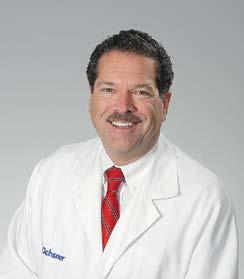
3 minute read
When rituals make life more difficult: Diagnosis and treatment of OCD
By Leslie Cardé | Contributing Writer
OCD is typically treated with a combination of psychotherapy and medications. Although most patients get relief from their symptoms, some patients continue to experience debilitating symptoms. Some people with this disorder also have other mental disorders alongside their OCD, among them anxiety, depression, and psychomotor tics (often seen in Tourette’s Syndrome).
For those who have been prescribed medication, it’s important to talk to health care providers about the risks and side effects. Never stop taking medications suddenly, as rebound effects can take place, possibly making symptoms worse, while the body experiences withdrawal symptoms.
Four years ago, the FDA approved a brain stimulating procedure called Transcranial Magnetic Stimulation as an adjunct in the treatment of OCD in adults.
Imagine being late to all your appointments because getting out of your house entails so many time-consuming rituals that you’re spending an hour repeatedly going back to your house to make sure the door is locked.
That’s a scenario that could occur if you have OCD, obsessive compulsive disorder.
“I should point out that ObsessiveCompulsive Personality Disorder is different from OCD,” explained Dean Hickman, M.D., Ochsner psychiatrist and system chairman of the Behavioral Health Service Line.
“The personality disorder is an obsession with orderliness, perfectionism and cleanliness, just to name a few of the obsessions and compulsions.
"But these are less intrusive than a true case of OCD, in which the obsession consists of persistent and unwanted thoughts and urges, which are intrusive.
"The compulsion portion involves repetitive behaviors that act on those urges."
For the diagnosis to apply, "the rituals have to be excessive and take up more than an hour a day. If you circle the block six times because you think you may have hit a squirrel, this is an example of OCD.”
Those who cannot throw things out, known as hoarders, fall into the OCD category as well.
Even when the hoarded objects take over an entire house, those with the disorder cannot stop collecting superfluous items. They may know their behavior makes no sense, but they can’t help themselves.
Shower after shower
Comedian Howie Mandel has talked extensively about his OCD, which he says wasn’t diagnosed until he was an adult, though he displayed all of the symptoms in his childhood.
Obsessed with germs, he would take shower after shower. He would find himself lining up the fringe on his friends' rugs.
“Psychiatrists have had some of the best results with Exposure and Response Prevention therapy,” said Kathleen Crapanzano, M.D., associate professor of clinical psychiatry at LSU Baton Rouge.


“With germaphobia, for example, we might gradually make the patient’s hands dirty, and try to get them to tolerate not washing their hands. It’s a form of cognitive behavioral therapy that involves confronting the thoughts, images and situations that make you anxious and/ or provoke your obsessions in a safe environment, in the hope that you learn to deal with these obsessions in a healthy way.”
Although there is no specific gene for OCD, research has shown that the disorder does run in families. Those with a parent or sibling who has OCD are at higher risk. There are other suspected causes, which include childhood traumas. In some cases, children may develop OCD or its symptoms following a streptococcal infection (strep throat, for example). These are known as PANDAS, for Pediatric Autoimmune Neuropsychiatric Disorders Associated with
“It’s a machine that uses a magnetic impulse which is safer and with less side effects than ECT (electro convulsive therapy),” said Hickman. “It’s been used already for severe depression ... It involves sitting in a glorified dental chair while an electromagnetic coil is placed on the scalp near your forehead. The magnetic pulse stimulates nerve cells in the region of your brain involved in mood control."
For those suffering with OCD, life can become an isolating series of smaller and smaller concentric circles, because patients tend to avoid situations that cause stress.
If they can’t get to a meeting on time, for example, they eventually avoid meetings altogether.
If you or someone you know think you may have symptoms that may be part of an OCD disorder, there is a quick online test, called the Yale-Brown OCD Scale. It is used for screening, with the caveat that no single test is meant to be a diagnosis and all results should be discussed with your healthcare provider. Go to: www.addictionsandrecovery.org/ tools/obsessive-compulsive-disordertest-yale-brown-ocd-scale-ybocs.pdf
--- Leslie Cardé
Streptococcal infections. Imaging studies have shown changes in the brain structure of those with OCD. There seems to be a connection between symptoms and abnormalities in certain areas of the brain. However, that research is underway. Understanding the causes of this disorder will ultimately help with the treatment.









